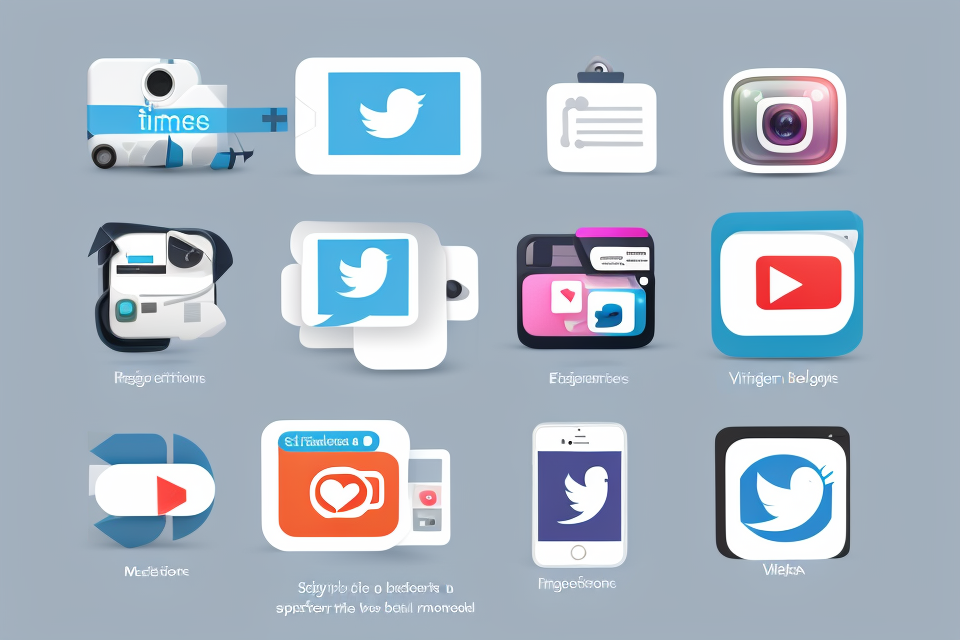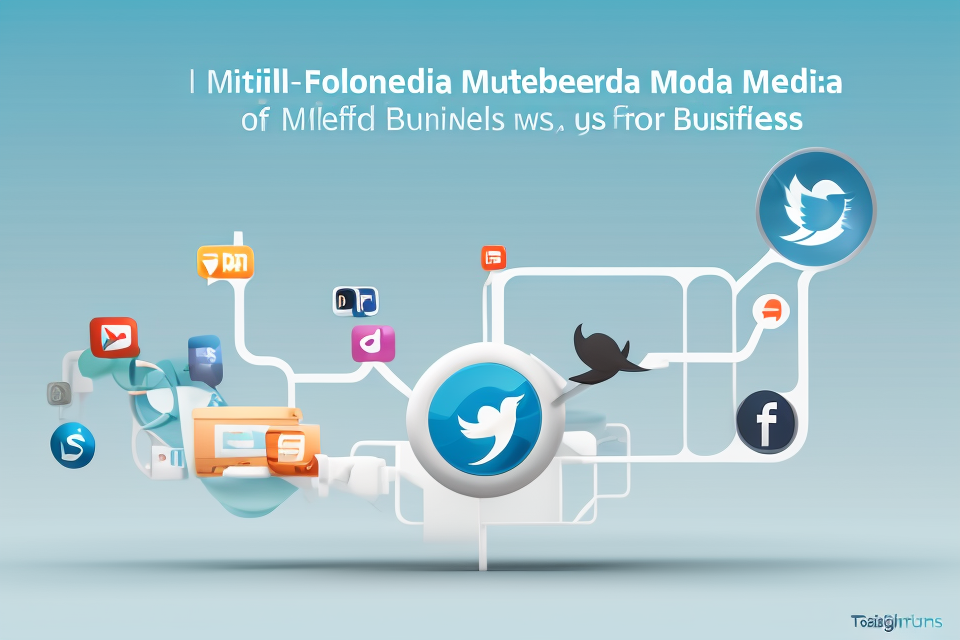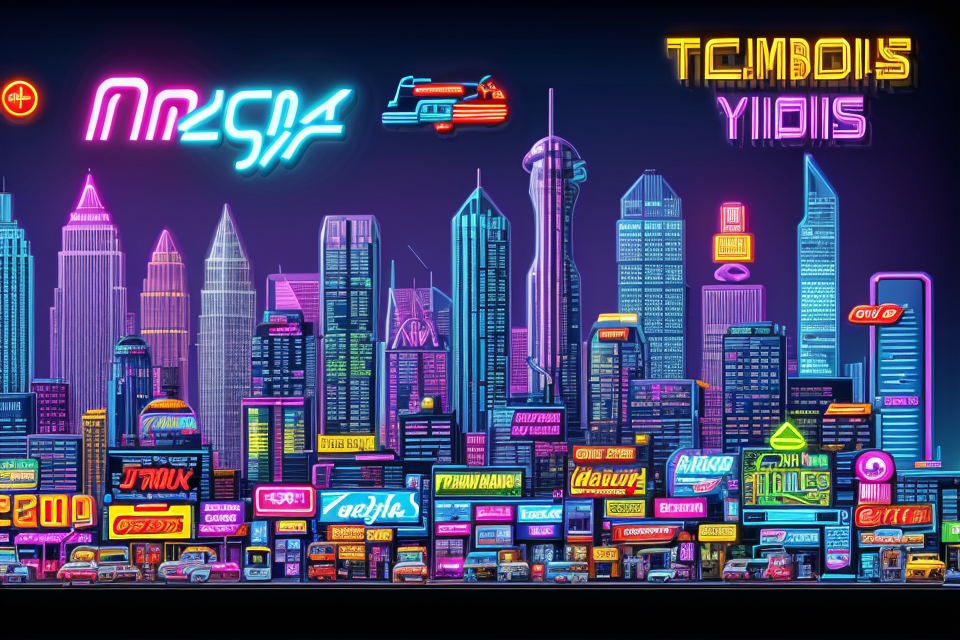Social media is a term that is used to describe online platforms and tools that allow users to create, share, and interact with content, information, and other users. With the rapid growth of social media, it has become an integral part of our daily lives, and it has changed the way we communicate, work, and socialize. However, despite its widespread use, there is no universally accepted definition of social media. In this guide, we will explore the different definitions and perspectives on social media, and provide a comprehensive understanding of what it is and what it means. So, let’s dive in and discover the world of social media.
What is Social Media?
A Definition
The term “social media” refers to online platforms and tools that allow users to create, share, and interact with content, information, and other users. Social media platforms can include websites, apps, and other digital tools that facilitate communication and sharing among individuals and groups.
Social media is a rapidly evolving and constantly changing field, with new platforms and tools emerging all the time. Some of the most popular social media platforms include Facebook, Twitter, Instagram, LinkedIn, and YouTube. These platforms allow users to connect with friends and family, share photos and videos, join groups and communities, and engage in a wide range of online activities.
In addition to these general-purpose social media platforms, there are also many specialized platforms that cater to specific interests and needs. For example, there are social media platforms for professional networking, for sharing and discussing news and current events, for collaborating on creative projects, and for many other purposes.
Overall, social media has become an integral part of modern life, transforming the way we communicate, connect, and interact with one another. Whether you’re using social media to stay in touch with friends and family, to promote your business or brand, or simply to stay up-to-date on the latest news and trends, it’s important to understand what social media is and how it works.
Perspectives on Social Media
When examining the concept of social media, it is important to consider the various perspectives that exist on its definition and function. Here are some of the most common viewpoints:
Social media as a means of communication and connection
One of the most widely accepted perspectives on social media is that it serves as a platform for communication and connection between individuals and groups. Through social media, people can share their thoughts, ideas, and experiences with others, regardless of their physical location. This has enabled the formation of online communities and the strengthening of existing relationships.
Social media as a tool for self-expression and community building
Another perspective on social media is that it is a tool for self-expression and community building. Through social media, individuals can share their thoughts, opinions, and creative content with a wider audience. This has led to the emergence of influencers and content creators who have built entire careers around their online presence. Additionally, social media has facilitated the formation of online communities centered around shared interests and hobbies, providing individuals with a sense of belonging and connection.
Criticisms of social media
While social media has undoubtedly brought many benefits, it has also faced criticism for its potential negative effects. Some argue that social media can lead to addiction, as people become absorbed in scrolling through their feeds and engaging with content. Additionally, concerns have been raised about privacy, as users may unwittingly share personal information that can be accessed by advertisers and other third parties. Finally, social media has been criticized for its role in the spread of misinformation, as false information can easily be shared and amplified through the platform.
Different Types of Social Media
1. Social Networking Sites
Social networking sites are a type of social media platform that allows users to connect with friends, family, and colleagues. These sites typically include features such as profiles, news feeds, and messaging systems, which allow users to share information and communicate with one another. Some of the most popular social networking sites include Facebook, Twitter, and LinkedIn.
One of the main benefits of social networking sites is that they provide a way for people to stay connected with others, even if they are geographically distant. For example, a person who has moved to a new city can use a social networking site to keep in touch with friends and family from their hometown.
Social networking sites are also commonly used for personal and professional networking. For example, a job seeker might use LinkedIn to connect with potential employers or industry leaders. Additionally, businesses often use social networking sites to promote their products or services and to engage with customers.
However, it is important to note that social networking sites also have their downsides. For example, some people may spend excessive amounts of time on these sites, which can negatively impact their productivity and social interactions in real life. Additionally, social networking sites have been known to contribute to the spread of misinformation and fake news, which can have serious consequences.
Overall, social networking sites are a popular type of social media platform that allow users to connect with others and share information. While they can be a useful tool for staying connected and networking, it is important to use them responsibly and in moderation.
2. Blogging Platforms
Blogging platforms are a type of social media that allow users to create and share content in the form of blog posts. Some popular examples of blogging platforms include WordPress, Blogger, and Medium. These platforms provide users with the tools and resources to create and publish their own blogs, which can then be shared with a wide audience.
Blogging platforms are often used for personal expression, journalism, and marketing. Users can create blogs on a variety of topics, from personal experiences and opinions to news and current events. Blogging has become a popular way for individuals to share their thoughts and ideas with a wider audience, and for businesses to promote their products and services.
In addition to providing a platform for users to share their own content, blogging platforms also offer the ability to interact with other users through comments and social media sharing. This allows for a sense of community and engagement, as users can share their thoughts and ideas with others and receive feedback.
Overall, blogging platforms are a valuable tool for individuals and businesses looking to share their ideas and connect with a wider audience.
3. Video Sharing Platforms
- Video sharing platforms are online platforms that allow users to upload and share videos with others.
- YouTube, Vimeo, and TikTok are examples of popular video sharing platforms.
- These platforms have become increasingly popular in recent years, providing a new way for people to connect and share content.
- Video sharing platforms are often used for entertainment, education, and marketing purposes.
- They provide a platform for individuals to showcase their talents, share knowledge, and promote products or services.
- In addition, they offer a way for businesses to reach a wider audience and engage with customers through video content.
- With the rise of mobile devices and social media, video sharing platforms have become a vital part of the social media landscape.
- They offer a unique opportunity for individuals and businesses to connect with their audience and build a community around their content.
- Overall, video sharing platforms have revolutionized the way people consume and share media, offering a new way to connect and engage with others online.
4. Photo Sharing Platforms
- Snapchat
- Flickr
- Photobucket
- SmugMug
Photo sharing platforms are a popular type of social media that allow users to upload and share photos with others. These platforms are often used for personal expression, marketing, and art.
- Instagram:
- Instagram is a photo and video sharing app that was acquired by Facebook in 2012.
- It allows users to share photos and videos, add filters and captions, and interact with other users through likes, comments, and direct messages.
- Instagram has over 1 billion active users and is popular among influencers, brands, and individuals looking to showcase their products, services, or personal lives.
- Snapchat:
- Snapchat is a multimedia messaging app that allows users to send and receive “snaps,” which are photos and videos that disappear after they are viewed.
- It also offers features like Snap Maps, Snapchat Stories, and Snapcash, which have helped to make it a popular platform for sharing personal moments and communicating with friends.
- Snapchat has over 500 million active users and is particularly popular among younger audiences.
- Flickr:
- Flickr is a photo sharing platform that was acquired by SmugMug in 2018.
- It allows users to upload, share, and organize their photos, and to connect with other users through groups and comments.
- Flickr has over 100 million registered users and is popular among photographers, artists, and enthusiasts looking to share their work and connect with others.
- Photobucket:
- Photobucket is a photo sharing platform that allows users to upload, share, and manage their photos.
- It offers features like custom photo albums, photo editing tools, and social sharing options, and has a community of users who share their photos and connect with others.
- Photobucket has over 10 million registered users and is popular among hobbyists and enthusiasts looking to share their photos and connect with others.
- SmugMug:
- SmugMug is a photo sharing platform that allows users to upload, share, and sell their photos.
- It offers features like customizable portfolios, professional printing options, and social sharing options, and has a community of users who share their photos and connect with others.
- SmugMug has over 30 million registered users and is popular among professional photographers and enthusiasts looking to showcase and sell their work.
5. Discussion Forums
Discussion forums are a type of social media platform that allow users to participate in discussions and ask questions. Some popular examples of discussion forums include Reddit, Quora, and Stack Exchange. These platforms are often used for information sharing, problem solving, and community building.
In a discussion forum, users can create topics or threads to start a conversation on a particular subject. Other users can then respond to these threads by posting their own thoughts, opinions, and information. Discussion forums can be moderated by a group of volunteers or a designated moderator to ensure that the conversations remain civil and respectful.
One of the key benefits of discussion forums is that they allow users to connect with others who share similar interests or experiences. Users can learn from each other and exchange information and advice. This can be particularly valuable for users who are looking for help with a problem or seeking information on a particular topic.
Discussion forums can also be a great way to build community and foster a sense of belonging among users. By participating in discussions and offering support to others, users can develop relationships with like-minded individuals and feel a sense of connection to a larger community.
However, it’s important to note that discussion forums are not without their risks. As with any online platform, there is always the potential for negative or harmful behavior from users. It’s important for users to be aware of these risks and to take steps to protect themselves, such as not sharing personal information and being cautious about clicking on links or downloading attachments from unknown users.
6. Messaging Apps
Messaging apps are a type of social media that allow users to send messages and make voice and video calls. These apps have become increasingly popular in recent years and are often used for personal and professional communication.
WhatsApp, Telegram, and Signal are some of the most popular messaging apps currently available. Each of these apps has its own unique features and benefits, but they all share the same basic functionality of allowing users to communicate with one another in real-time.
WhatsApp, for example, has over 2 billion active users and is widely used in many countries around the world. The app is known for its simplicity and ease of use, as well as its end-to-end encryption feature, which helps to keep users’ conversations private.
Telegram is another popular messaging app that has gained a large following in recent years. The app is known for its focus on privacy and security, as well as its ability to create large group chats with up to 200,000 members.
Signal is a messaging app that has gained popularity due to its focus on privacy and security. The app is open source, meaning that its code is available for anyone to review, and it has been endorsed by many privacy advocates.
Overall, messaging apps have become an essential tool for communication in the digital age. They offer a convenient and efficient way for people to stay in touch with one another, whether it’s for personal or professional purposes.
7. E-commerce Platforms
- Amazon
- Founded in 1994 by Jeff Bezos, Amazon is a multinational technology company that focuses on e-commerce, cloud computing, digital streaming, and artificial intelligence.
- Amazon’s e-commerce platform allows users to purchase a wide range of products, including books, electronics, household items, and more.
- With its extensive product catalog, user-friendly interface, and reliable shipping services, Amazon has become one of the most popular e-commerce platforms in the world.
- Etsy
- Etsy is a global online marketplace where users can buy and sell handmade or vintage items, as well as unique factory-manufactured items.
- Launched in 2005, Etsy allows individuals and small businesses to sell their creations to a large and diverse audience.
- Etsy’s platform emphasizes the promotion of small businesses and sustainable practices, making it a popular choice for consumers who value unique and eco-friendly products.
- Shopify
- Shopify is a leading e-commerce platform that enables individuals and businesses to create and manage their online stores.
- With its user-friendly interface and customizable templates, Shopify allows users to create professional-looking websites without any coding knowledge.
- Shopify’s platform also offers a range of features, such as payment processing, inventory management, and shipping integration, making it a comprehensive solution for online retailers.
Overall, e-commerce platforms like Amazon, Etsy, and Shopify have revolutionized the way people buy and sell goods and services online. By providing users with a convenient and accessible way to shop, these platforms have transformed the retail industry and enabled small businesses to reach a global audience.
Social Media Usage and Impact
The Positive Side
- Increased communication and connection between individuals and groups
- Social media platforms allow people to connect with others from all over the world, breaking down barriers of distance and geography.
- This increased connectivity has led to the formation of online communities and networks, where people can share ideas, collaborate on projects, and support each other.
- Social media has also made it easier for people to stay in touch with friends and family, even when they are physically far apart.
- Increased access to information and knowledge
- Social media provides a wealth of information and knowledge, with users able to access news, articles, and other content from a wide range of sources.
- This has enabled people to learn about a variety of topics and issues, and has provided a platform for the dissemination of information and ideas.
- Social media has also made it easier for people to access educational resources and online courses, expanding their knowledge and skills.
- Enhanced personal and professional networking
- Social media has revolutionized the way people network, both personally and professionally.
- Users can connect with others in their industry or field, sharing ideas and collaborating on projects.
- Social media has also made it easier for people to find and connect with potential employers, clients, and business partners.
- Additionally, social media platforms have created new opportunities for freelancers and entrepreneurs to promote their services and reach a wider audience.
The Negative Side
- Addiction and time-wasting: One of the most significant negative aspects of social media is its potential for addiction. Studies have shown that excessive use of social media can lead to compulsive behavior, causing users to spend excessive amounts of time scrolling through their feeds instead of engaging in other activities.
- Privacy concerns and data breaches: Social media platforms often collect and store vast amounts of personal data from their users. This data can be vulnerable to breaches, leaks, and misuse by third parties. In addition, social media platforms may share user data with advertisers and other third parties, potentially compromising user privacy.
- Spread of misinformation and fake news: Social media has become a breeding ground for misinformation and fake news. False information can spread rapidly across social media platforms, leading to widespread confusion and misinformation. This can have serious consequences, particularly during times of crisis or political turmoil.
Furthermore, the ease with which users can create and share content on social media platforms has led to an increase in the spread of hate speech, harassment, and cyberbullying. These negative effects of social media can have serious consequences for individuals, communities, and society as a whole.
The Future of Social Media
The future of social media is shaped by various factors, including technological advancements, user preferences, and the evolving needs of businesses and organizations. As social media platforms continue to grow and develop, new opportunities for innovation and creativity arise. However, it is crucial to ensure that the use of social media remains responsible and ethical to avoid negative consequences.
Here are some potential developments in the future of social media:
- Continued evolution of social media platforms and tools
- Platforms will continue to introduce new features and tools to enhance user experience and engagement. This may include more interactive and immersive content formats, such as virtual and augmented reality, as well as advanced analytics and targeting capabilities for advertisers.
- Platforms may also explore ways to address issues related to privacy, data security, and misinformation, which are becoming increasingly important concerns for users and businesses alike.
- Potential for new and innovative uses of social media
- Social media has already been used for a wide range of purposes, from personal communication and entertainment to political activism and business marketing. In the future, we can expect to see even more creative and unexpected uses of social media, as users and businesses continue to experiment and push the boundaries of what is possible.
- For example, social media may be used more extensively for education and learning, as well as for building and maintaining social connections in a virtual world.
- Need for responsible and ethical use of social media
- As social media becomes more ubiquitous and influential, it is essential to ensure that its use is responsible and ethical. This includes addressing issues related to privacy, data security, and misinformation, as well as promoting diversity, inclusion, and respect online.
- Businesses and organizations also have a responsibility to use social media in a way that is transparent, honest, and respectful of their customers and stakeholders. This may involve being more proactive in addressing negative feedback and criticisms, as well as being more transparent about their use of user data and targeting practices.
FAQs
1. What is social media?
Social media refers to online platforms and tools that allow users to create, share, and interact with content, information, and other users. Social media platforms can include social networking sites, blogs, forums, video sharing sites, and other types of online communities.
2. What are the different types of social media?
There are many different types of social media, including social networking sites (such as Facebook and Twitter), microblogging sites (such as Tumblr and Instagram), video sharing sites (such as YouTube and Vimeo), and image sharing sites (such as Flickr and Pinterest). There are also professional networking sites (such as LinkedIn), forums, and blogs.
3. What are the benefits of using social media?
Social media can provide a variety of benefits, including staying connected with friends and family, building and maintaining professional networks, sharing information and ideas, and staying up-to-date on current events. Social media can also provide a platform for self-expression and creativity, and can be a useful tool for businesses to reach and engage with customers.
4. What are the risks associated with social media use?
There are a number of risks associated with social media use, including privacy concerns, cyberbullying, online harassment, and the spread of misinformation. It is important for users to be aware of these risks and to take steps to protect themselves, such as using privacy settings and blocking or reporting inappropriate behavior.
5. How can I stay safe while using social media?
To stay safe while using social media, it is important to be aware of the risks and to take steps to protect yourself. This can include using privacy settings to limit the amount of personal information that is visible to others, blocking or reporting inappropriate behavior, and being cautious about what you share online. It is also a good idea to use strong, unique passwords and to regularly review your privacy settings.



